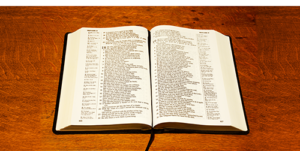Dr. McKellar’s Lesson for August 27, 2017
Guest Speaker: Ryland Whitehorn
A special lesson was presented today, in combination with other Sunday School classes, on personal evangelism, promoting the Three Circles Life Conversation Guide.
Dr. McKellar’s Lesson for August 20, 2017
“I Shall Yet Praise Him!” Psalm 42:1-11 Bible Study 08/20/17
Our psalm this morning is the first psalm of the second “book” of psalms (42-72). These psalms point forward to the fulfillment of all things in Christ and relate concretely to the experiences of God’s people in every generation. Psalm 42 is addressed to the choirmaster and is a musical selection from the temple musicians, the sons of Korah.
I. Introduction
-“God in the Psalms is the all-satisfying object.” (C.S. Lewis)
-the salvaged sons of Korah
II. An Appetite to Observe (1-5)
-longing for God because of absence from corporate worship
-corporate expression and encounter
-homesickness for the house of God
III. An Example to Follow (6-11)
-suffering that exposes secondary satisfaction
-learning to talk to yourself: “pierce” the mind
-looking away to the Lord of life
-the Great Worshiper: our Helper
IV. So What?
-Because the Lord alone satisfies, crave and praise Him in every circumstance and event.
-Recognize the “resolution” in Psalm 43.
-Preach the gospel to yourself regularly!
Dr. McKellar’s Lesson for August 13, 2017
“Prayer as Worship” Psalm 141:1-10 Bible Study 08/13/17
While this psalm of David is not connected explicitly to a specific occurrence/event in his life, it does present the picture of a harassed soul who is being tempted to “slacken his hold on God.” For this reason, Psalm 141 offers powerful insights for believers today in the midst of their earthly pilgrimages. There are perils, both internal and external, which can hinder our progress on the path marked out for us by the Lord. Therefore, our lives should be marked by a desperate dependence which articulates itself in worshipful prayer.
I. A Desperate Sense of Need (1-2)
-urgent cry
-act of worship: “incense” and “sacrifice”
-Rev. 5:8
II. A Distinct Sense of Stewardship (3-7)
-speech, heart, action (Jer. 17:9, Luke 6:45)
-preference for the rebuke of the righteous over the flattery of the wicked
-assured sense of justice
III. A Declaration of Dependence (8-10)
-orientation
-protection
-NT connection: Heb. 2:6-9, 12:2
IV. So What?
-When your eyes are set toward God, you can navigate the dangers of this life with confidence.
-Ponder the fact that you are “in peril” every day.
-“You have never spoken a word that belongs to you, because words belong to the Lord.” (Tripp)
-“The reason for the fixed look of faith lies in the divine names.” (Maclaren)
-“Our prayer and God’s mercy are like two buckets in a well; while one ascends, the other descends.” (E. Hopkins)
Dr. McKellar’s Lesson for August 6, 2017
“When ‘The Man’ Is You” Psalm 51:1-17 Bible Study 08/06/17
This morning we will focus on the best known of the seven “penitential” psalms (6, 32, 38, 51, 102, 130, 143). Psalm 51 includes a full confession of sin that is without parallel in any other psalm.
I. Background/Setting
-note the superscription
-confrontation by Nathan in 2 Samuel 12:1-15…
-following David’s sin with Bathsheba in 2 Samuel 11:1-5…
-and the murder of her husband, Uriah the Hittite (2 Samuel 11:14-15, 1 Chron. 11:41, 2 Samuel 11:27).
II. Return for Pardon (1-9)
-appropriation of the promise of forgiveness
-appeal to the merciful character of God
-sin: transgression, iniquity, sin
-forgiveness: blot, wash, cleanse
-acknowledgment of ultimate offense
-awareness of infection and urgent petition
III. Restoration of Purity (10-12)
-create and renew
-cast and take not
-restoration of joy and corresponding willingness
IV. Renewal of Purpose (13-17)
-instructional “evangelism”
-the tongue’s testimony of righteousness
-broken-hearted joy: the “eloquence” of brokenness
V. So What?
-When ‘the man’ is you, cling to the character of God as your sole cause for hope.
-Make the connection to Christ: Romans 3:21-26
-“Every sin is cosmic treason, an overthrowing of the One to whom you owe everything.” (T. Keller)
-“He goes safely who goes humbly.” (MacLaren)
-“The number of the psalmist’s sins drives him to contemplate the greater number of God’s mercies.” (MacLaren).
Dr. McKellar’s Lesson for July 30, 2017
“Perpetual Praise” Psalm 146:1-10 Bible Study 07/30/17
This psalm is the first of five psalms of praise which bring the Psalms to a close. Each of these psalms begins and ends with “Praise the LORD” (Hallelujah). Fittingly, Psalm 146 and the psalms which follow it express the ultimate outcome for those who trust in the LORD. Their “story” will end in unbroken praise and delight.
I. Commitment to Praise (1-2)
-corporate and individual
-the “ring of resolve”: beyond the mood of the moment
II. Caution about Praise (3-4)
-prohibition: “Put not your trust…”
-understanding of “princes”
-perspective: inability and temporality
-whether revered or reviled: man…earth (Gen. 3:19)
III. Contrast Related to Praise (5-9)
-help…Jacob
-hope…LORD God
-eleven verbs
-five-fold repetition of LORD
-connection to Isa. 61/Luke 4
IV. Continuation of Praise (10)
-how the “story” ends
-not an empty-headed hallelujah
V. So What?
-Because the LORD alone is your sure help and hope, commit yourself to His perpetual praise.
-Let your praise be word-driven rather than mood-driven.
-Avoid the dishonor and devastation of misplaced trust.
-“My days of praise shall ne’er be past, while life, and thought, and being last, or immortality endures.” (Watts)
Dr. McKellar’s Lesson for July 23, 2017
Guest Speaker: Dr. Barry McCarty
“Jesus Heals a Woman with a Hemorrhage” – Mark 5:24-34
The incident is book-ended by the healing of the Gerasene demoniac occurring before and Jesus raising Jairus’ daughter from the dead afterward.
The woman’s ailment caused her to be unclean under the law, adding further to her misery.
Verses 25-27 contain seven Greek participles, describing the history of her condition.
Obviously, she had heard of Jesus and believed what she had heard. She thought that all she had to do was to just touch the hem of His garment.
In verse 31, the Greek for touch is hapto. The word has migrated into English as haptic, as relating to the employment of touch. And, in the Greek text of Mark, the verb, touch, is in the feminine case, indicating that Jesus knew a woman had touched Him. In fact, Jesus, as God, knew all about it well before the incident occurred.
In verse 34, Jesus informs the woman that it was her faith responsible for her healing; her action of touching Him was merely the evidence of her faith.
The Greek verb, translated as “healed” here, is also translated elsewhere as “saved.”
Dr. McKellar’s Lesson for July 16, 2017
“God Revealed” Psalm 19:1-14 Bible Study 07/16/17
This morning we will turn our attention to Psalm 19 and its poetic and powerful testimony to the reality of God’s revelation. We will be reminded that He has revealed Himself through both the skies and the Scriptures. His revelation of Himself should be a source of preoccupation for us.
I. God’s Revelation through the Skies (1-6)
-declaring and proclaiming glory
-pointers to the living God
-the poetic and the theological (Rom. 1:18-20, Acts 14:14-18; 17:24-30)
-the “gushing” speech of nonverbal communication
-beaming bridegroom and conquering champion
II. God’s Revelation through the Scriptures (7-11)
-use of Hebrew poetic parallelism/repetition
-revelation term, descriptive adjective, distinct impact
-desirability: gold…much gold…much fine gold
-trajectory: reality, life, wisdom, contentment (Deut. 32:46-47)
III. Our Response to God’s Revelation (12-14)
-conviction of sin
-cry for forgiveness
-commitment to holiness: mind and mouth
-rock and redeemer (Heb. 1:1-4)
IV. So What?
-Summary: words of the heavens in our sight, words of God for our instruction, our words in God’s sight (C. Blaising)
-Because God communicates His surpassing worth through His works and words, value Him supremely.
-“Because the Bible is the word of God, it has effects on us that are better than the effects of anything else we can read, study, watch or listen to.” (Piper)
-“Sing them over again to me, Wonderful words of life, Let me more of their beauty see, Wonderful words of life…” (P. Bliss)
Dr. McKellar’s Lesson for July 9, 2017
“Worship and Warning” Psalm 95:1-11 Bible Study 07/09/17
This morning our study of Psalm 95 will challenge us regarding the principle of God-centered worship. This psalm is an introductory psalm to a series of psalms devoted to the theme of worship (Psalms 95-100). Although Psalm 95 has no superscription or prescribed historical setting, it serves as a timeless reminder for believers to focus the attention of their minds and the affection of their hearts on the living God.
I. Hasten to Worship (1-5)
-methodology: focused, corporate and vocal
-reasons for worship: greatness, reality, sovereign hands
II. Heed the Call to Reverent Worship (6-7a)
-from animated speech to speechless prostration
-our Maker and our God
-His shepherding hand
III. Heed the Warning Related to Worship (7b-11)
-Today…
-do not harden your hearts
-Meribah and Massah (Ex. 17:1-7; Num. 20:1-13)
IV. So What?
-Knowing that you are prone to wander, prioritize worship in order to persevere in obedience.
-“Come Thou fount of every blessing, Tune my heart to sing Thy grace. Streams of mercy, never ceasing, call for songs of loudest praise…” (R. Robinson)
-Haphazard worship contributes to a hardened heart.
-Biblical worship is always rooted in biblical revelation.
Dr. McKellar’s Lesson for July 2, 2017
“Sacred Passion” Psalm 84:1-12 Bible Study 07/02/17
This morning we turn our attention to Psalm 84 and the psalmist’s intense longing for the presence of God. While we are unsure of the writer’s exact circumstances at the time of the composition of the psalm, we can be sure of the intense use of poetical Hebrew language to express the inestimable and incomparable value of fellowship with the living God.
I. Background/Context
-Gittith
-sons of Korah
-significance of “blessed”
II. Longing for God (1-4)
-intense longing
-not architecture but presence
-satisfaction in the living God
-blessed rest
III. Journeying with God (5-8)
-blessed seeking/pilgrimage
-expectation of Baca
-strength to strength
IV. Delighting in God (9-12)
-a king and a King
-the infinitely better status
-no good thing withheld
-sun and shield
-blessed trust
V. So What?
-View your pilgrimage through this life as an ongoing opportunity to respond to the living God with delighted trust.
-Magnify your pilgrim status.
-Rejoice in the fact that “God does not waste our experiences.”
-Ponder the current level of your passion for the presence of God.
-“The least degree of fellowship with God has delights superior to the greatest measure of earthly joys.” (Maclaren)
-Reflect on 2 Peter 3:8 and Romans 8:32!




